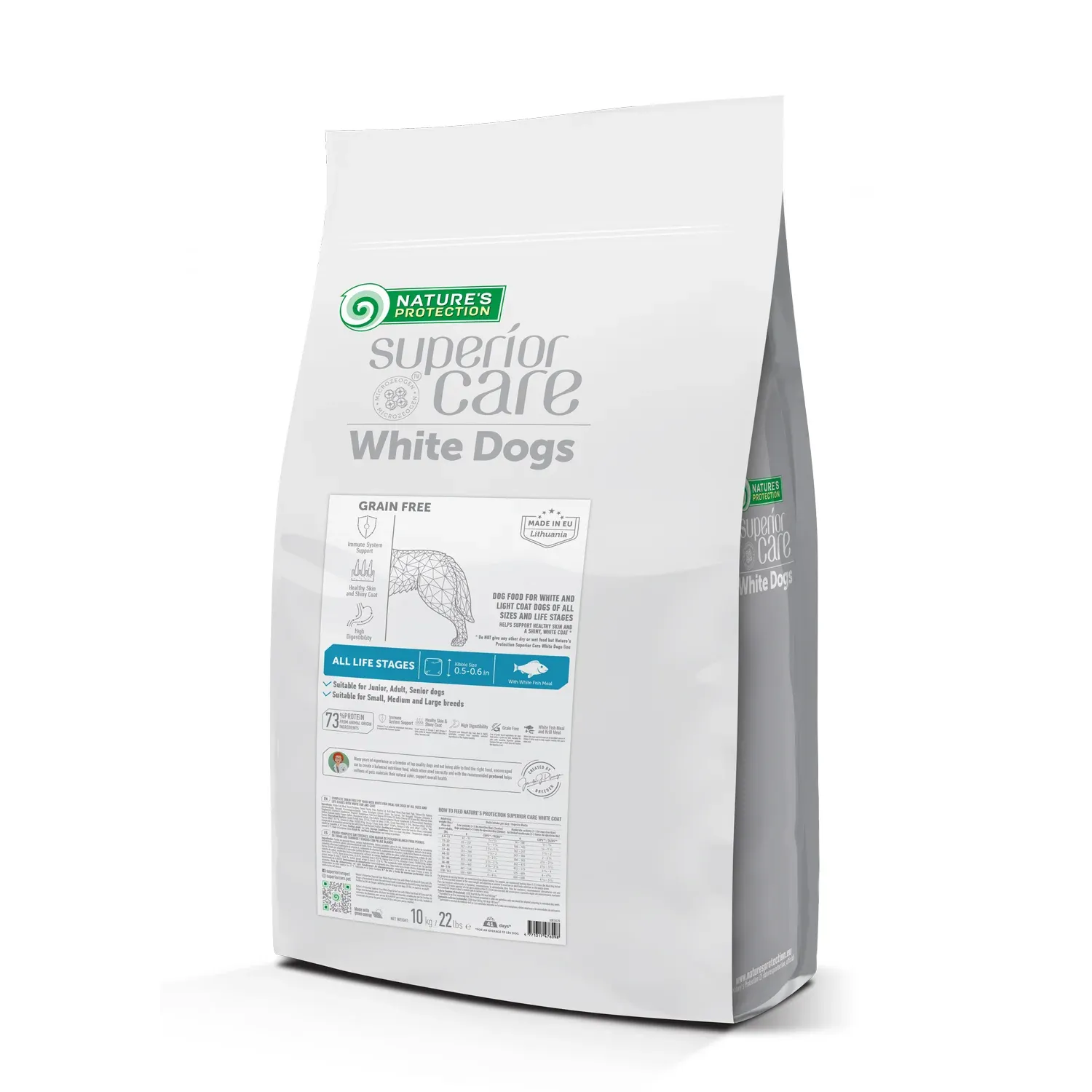White-coated dogs often struggle with unsightly tear stains and coat issues, making specialized nutrition essential. Nature’s Protection Superior Care White Dogs Dog Food (Dry) stands out as a targeted solution, earning an average rating of 4 stars across its 14-recipe lineup. Formulated to minimize brown tear stains while supporting skin and coat health, this range suits dogs of all ages, sizes, and breeds. Backed by pet nutrition experts like Laura Ward, who holds a BSc in Animal Science, this review breaks down its strengths, ingredients, and value for pet parents seeking premium dry kibble.
Whether you’re feeding a puppy, adult, or all-life-stages companion with light fur, these recipes prioritize high-quality proteins and omega fatty acids. Highly recommended options like the Puppy for Light Coat All Breeds with Salmon score a perfect 5 stars. Let’s dive into the details to see if it fits your dog’s needs.
Our Verdict and Recipe Ratings
Nature’s Protection Superior Care White Dogs Dog Food excels in meat-rich formulas without artificial flavors or preservatives. The overall line averages 4 stars, with ratings from 3 to 5 stars. Three insect-protein recipes remain unrated due to evolving review criteria for this innovative protein source—early studies show promise for digestibility and sustainability.
Here’s a breakdown of all recipes, including AAFCO nutrient profiles (G for Growth/puppy, M for Maintenance/adult, A for All Life Stages):
| Product | Rating | AAFCO |
|---|---|---|
| Junior Small & Mini Breeds with White Fish | 4.5 | G |
| Adult Light Coat Small & Mini with Salmon | 4 | M |
| Puppy Light Coat All Breeds with Salmon | 5 | G |
| Junior Light Coat All Breeds with Salmon | 4 | G |
| Adult Light Coat Small Breed with Insects | Not rated | M |
| Adult Light Coat Small & Mini with White Fish Protein | 4 | M |
| All Life Stages Light Coated All Breeds with Insect | Not rated | A |
| Adult Light Coat Small & Mini with Lamb | 4 | M |
| Adult Light Coat Large Breed with White Fish | 4 | M |
| Adult Light Coat Small Breeds with Lamb | 3 | M |
| All Life Stages Light Coat All Breeds with White Fish | 4.5 | A |
| All Life Stages Light Coat All Breeds with White Fish & Rice | 4.5 | A |
| All Life Stages Light Coated All Breeds with Insect & Rice | Not rated | A |
| Junior Light Coat All Breeds with White Fish & Rice | 5 | G |
 Nature’s Protection Superior Care White Dogs product bag showing white fish formula
Nature’s Protection Superior Care White Dogs product bag showing white fish formula
This image highlights the premium packaging of the All Life Stages formula, emphasizing its focus on light-coated breeds.
Pros and Cons
Pros:
- High-quality animal proteins like white fish, salmon, and krill for optimal nutrition.
- Omega-3 and omega-6 fatty acids from salmon oil and krill to enhance coat shine and reduce tear staining.
- Prebiotics like fructooligosaccharides for gut health.
Cons:
- Lacks explicit AAFCO statement on the brand website (though recipes meet profiles).
- Some formulas include controversial beet pulp as a fiber source.
- Insect-based options unrated pending further research.
For grain-free alternatives, check out 4health grain free dog food reviews to compare options without potatoes or peas.
Detailed Recipe Analysis: Junior Light Coat All Breeds with White Fish & Rice
We analyzed this top-rated (5-star) puppy recipe as a representative sample. Key ingredients: white fish meal (first), dried potatoes, sweet potato, peas, poultry fat, krill meal, dried beet pulp, salmon oil, flaxseed, and more.
Estimated Dry Matter Nutrient Content:
| Method | Protein | Fat | Carbs |
|——–|———|—–|——-|
| Guaranteed Analysis | 24% | 13% | N/A |
| Dry Matter Basis | 27.7% | 15.2% | 41.1% |
| Calorie Weighted | 24% | 31% | 45% |
Fiber: 4.1%. This profile offers near-average protein (26% brand-wide), below-average carbs (42.1%), and balanced fat (14.9%), ideal for active white-coated pups.
In-Depth Ingredients Breakdown
- White fish meal: Concentrated marine protein from Canadian/California sources, rich in omega-3s for skin health.
- Dried potatoes and sweet potato: Gluten-free carbs with fiber and beta-carotene; peas add plant protein (25% content noted for meat evaluation).
- Poultry fat: Linoleic acid source, though generic compared to named fats.
- Krill meal: Boosts protein (300% more than fresh) and astaxanthin for coat pigmentation.
- Salmon oil: Premium EPA/DHA for anti-inflammatory benefits.
- Beet pulp: Debated fiber; supports digestion in moderation per veterinary studies.
- Others: Yucca for odor control, green tea extract as antioxidant, sodium selenite (controversial selenium form—prefer yeast sources), and rosemary for preservation.
These align with expert recommendations from nutritionists like Laura Ward, emphasizing digestible, palatable nutrients for tear-stain reduction.
Nutrient Profile and Brand Comparison
The line’s fat-to-protein ratio (58%) suits maintenance and growth. Compared to average dry foods, it’s protein-forward with controlled carbs, promoting lean muscle and lustrous coats in breeds like Maltese, Westies, or Dalmatians prone to staining.
No recall history through November 2025, underscoring reliability. Superior Care Pet, a Lithuanian family business since 1991 with 35 years in breeding, expanded to the US in 2021.
Final Thoughts
Nature’s Protection Superior Care White Dogs Dog Food (Dry) delivers on its promise for light-coated dogs, with 4-star average ratings and science-backed ingredients for tear stain control and vitality. Consult your vet for breed-specific needs, especially for insect formulas.
Ready to try it? Shop via trusted retailers and monitor your dog’s response. For more dog food insights, explore our reviews.
References:
- AAFCO Nutrient Profiles: dogfoodadvisor.com/frequently-asked-questions/aafco-nutrient-profiles/
- Brand Site: Superior Care Pet (Lithuania-based formulas).
- Expert Verification: Laura Ward, Pet Nutritionist, BSc Animal Science.
